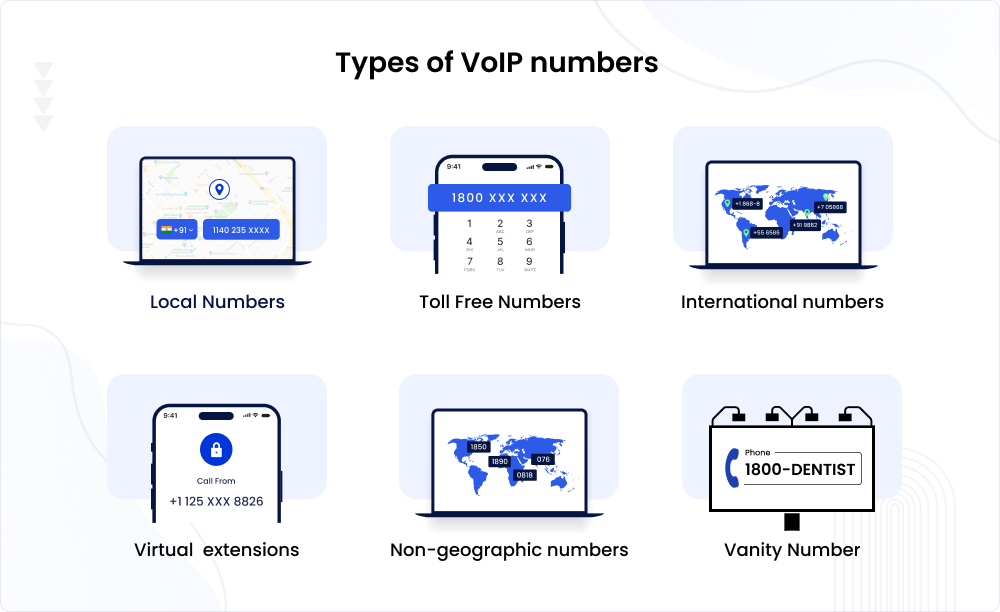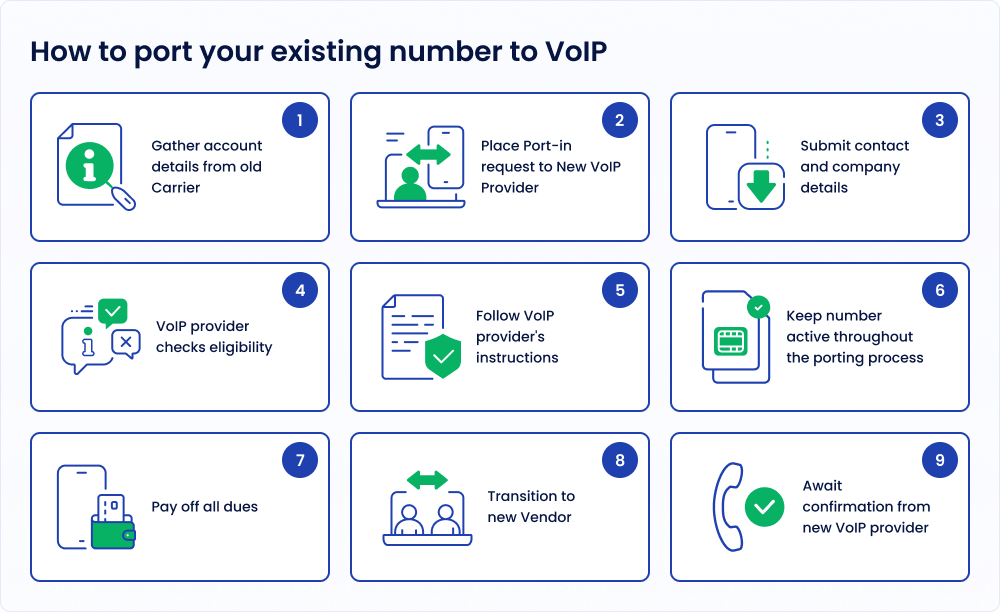Are you wondering how to take your business operations to the next level?
You’re going to need a tool that will help you deliver round-the-clock services without sacrificing quality.
In short, you will need a VoIP (Voice over Internet Protocol) number.
The next question could arise, “how does a VoIP number transform your business operations?”
Here’s how…
Unlike traditional phone lines, VoIP numbers leverage the power of the internet to transmit voice data, offering cost-effective and feature-rich solutions. They have been revolutionizing the way small and mid-sized businesses (SMBs) connect with customers, partners, and teams.
Why VoIP Numbers are Crucial for Small and Mid-Sized Businesses (SMBs)
When it comes to SMBs, every resource counts. VoIP numbers offer a range of benefits, including substantial cost savings, enhanced flexibility, and a wide range of features. This guide will walk you through everything you need to know to leverage VoIP numbers for the growth and success of your growing business.
What are VoIP Numbers
VoIP technology converts voice signals into digital data packets that can travel across the internet. This process enables real-time, high-quality voice communication, removing the need for traditional phone lines.
VoIP numbers are virtual and can be operated from any smartphone or computer with an internet connection. This versatility empowers you to communicate seamlessly across various platforms and locations. It is a powerful tool that gives you access to many game-changing features in a competitive market, that too at an affordable price.
Why does your business need VoIP numbers
Cost Efficient
Cost efficiency is the biggest reason why companies have been switching over to VoIP technology. 82% of businesses stated that their cost savings went up after switching over to VoIP. VoIP solutions are far cheaper than traditional phone systems and they also give more than value in return. Since the solutions operate over the internet, the charges incurred remain significantly low.
The feature to price ratio is unmatchable when it comes to VoIP numbers. Premium features such as call recording, real time analytics, conference calling, barging, and many more wrapped into one number. Combined, they enhance your calling operations in multiple folds, without increasing your expenses.
Easy to set up
VoIP numbers do not require any traditional physical landline phones to be set up for making calls. They can be accessed through any device connected to the internet. All you require while setting up is a computer or a smartphone or a VoIP enabled desk phone.
Yes, setting up VoIP numbers does require an initial investment to set up the devices in place. Later, it’s only a matter of maintenance and regular updates which are automated and require no additional expense.
Remote work capability
We have already mentioned how VoIP numbers can be accessed from any internet enabled or VoIP enabled device. This means you can make calls from one part of the world and connect with a customer on another.
It allows you to expand your business across different regions without setting up a physical office there. You can hire remote employees from different locations and assign them VoIP numbers on their existing devices. They can make calls effortlessly as long as they have a stable internet connection.
Did you know?
According to a 2021 report by Owl Labs, 90% of employees said that they had the same productivity levels even when working from home.
Easy Portability
Another great aspect of VoIP is that it allows you to convert your existing numbers into a VoIP number. Let’s say you have a designated business number which you have been using for customer interactions and wish to continue using that. VoIP providers give you the flexibility to port those existing numbers to VoIP. We will discuss how you can port your existing numbers to VoIP in only a few steps.
Secure
VoIP numbers make sure your calls are super safe. They use special codes to turn your chat into secret messages that only you and the person you’re talking to can understand. Think of it like a secret language! Plus, if you use a VPN, it’s like having a super secure tunnel just for your calls. It ensures nobody else can listen in.
Don’t forget about strong passwords- they’re like the super lock on your front door, keeping any unwanted guests out. Similar to updating your computer or smartphone helps it run better, keeping your VoIP system up to date keeps it extra safe.
Types of VoIP numbers

Local Numbers
These are like your regular phone numbers, but not tied to a specific location. VoIP providers let you pick an area code from almost anywhere. This way, when your agents make the call, it looks like you’re calling from the same locality, even if they’re far away. Hence the name, local numbers. For example: (555) 123-4567 is a local number where 555 is the area code for a specific location.
Toll-Free Numbers
You’ve probably seen these numbers starting with 800, 888, 877, and so on. Numbers with such prefixes are known as buy Toll free numbers. When customers call you on these numbers, they are not charged anything, encouraging them to reach out to you without hesitation. Several businesses use them a lot for customer service hotlines or ordering lines.
International Numbers
If you have friends, family, or customers in different countries, this is where international numbers come in handy. These are numbers with an area code from another country, making it easy and affordable for people there to get in touch with you. International VoIP numbers help you build a global presence in your target regions without setting up your business there.
Virtual Extensions
Virtual extensions, also known as virtual phone extensions, are like the little branches off your main number. They let you create additional lines or numbers associated with your main business phone number. You can use them to direct callers to different departments or people within the company. They’re not tied to physical phone lines, but rather operate through internet connectivity.
Non-Geographic Numbers
These numbers don’t belong to a specific location. Large businesses that don’t want to tie their numbers to a particular location often use them for their customer interactions. Having a local presence builds trust and rapport with customers. Geographic VoIP numbers allow you to establish a local presence in different regions without the need for physical offices.
Vanity Numbers
Vanity numbers are memorable, brand-enhancing numbers that can leave a lasting impression on customers. These are combinations of alphabets and numbers to form a unique number that represents your bran identity. Crafting a memorable vanity number involves creativity and strategic thinking.
You must consider your branding efforts and what your business stands for. Having a number that matches with your branding campaign makes it easier for customers to remember and recognize it faster. In a study by the Mountain Marketing Group, 84% of the prospects were able to remember the provided phone numbers because it had letters instead of numbers.
How to get a VoIP number for your business?
Getting your hands on a VoIP number is a relatively easy process now. You can get a VoIP number by following the following steps.
- Prerequisites: Analyze and determine your communication requirements, current device setup, and connectivity. Create a list of the features, budget, security level, and quality of service your business needs.
- Select a VoIP Provider: List out potential VoIP providers with their plans, reviews, types of services, and use cases. Before you narrow down the final candidate, ensure they meet all the requirements, and they have flexible plans for scalability.
- Purchase VoIP plan: Meet up with the VoIP provider and discuss your requirements with them. Select one of their subscription plans that seems most suitable for your business and sign up.
- Setup account: Setup your account, select the devices your agents will be receiving the calls on, and define parameters for all calling operations.
Once your VoIP plan is active, you can start making calls or invite customers to call your VoIP numbers to interact with you.

What are the factors you must consider before selecting a VoIP provider
When obtaining VoIP numbers, choosing the right service provider is crucial. Look for reputable providers with a track record of reliability and customer support. Check for reviews and ask for recommendations from industry peers.
Consider factors such as pricing, scalability, available features, and customer support before selecting one. Also, verify if the provider offers number porting services, which can simplify the transition to VoIP.
How to port your existing number into a VoIP number
If your business already has established phone numbers, porting them to VoIP can streamline communication processes. Learn the steps involved in transferring your existing numbers to a VoIP system.

How to set up VoIP numbers for your business
There are several VoIP providers across the globe who provide numerous VoIP based solutions. VoIP numbers are just one of them. One would assume that there are multiple ways to set up a VoIP account for your business, but it’s not. You can categorize these steps for the sake of understanding.
#1 Gather Necessary Equipment
Depending on your requirement, you may need multiple VoIP phones, headsets, or devices with softphone capabilities (computers and smartphones). The next thing you will need is a reliable and high-speed internet connection for quality VoIP calls. Ensure that your internet service meets the necessary bandwidth requirements.
If you’re using physical VoIP phones, follow the provider’s instructions to connect and configure them to your network. Download and install the necessary software provided by your VoIP service provider for softphones.
#2 Configure VoIP Features
Set up key features like call forwarding, voicemail, call routing, and auto-attendants according to your business needs. Record personalized voicemail greetings and set up voicemail boxes for each user or department.
#3 Establish Call Routing
Configure call routing rules to direct incoming calls to the appropriate extensions or departments. Integrate VoIP with other essential business tools like CRM software, email, and productivity applications for seamless workflow.
#4 Test and Secure
Conduct thorough testing to ensure that calls are clear and that all features are functioning as expected. Address any issues or glitches that arise during testing. Implement security measures like strong passwords, encryption, and regular system updates to protect your VoIP network from potential threats.
How to protect against VoIP fraud attacks?
Protecting your VoIP solution against fraud attacks is crucial for maintaining the security and integrity of your business communication. They can lead to financial losses and compromise sensitive information. Here are some effective measures to safeguard your VoIP phone system:
- Use unique passwords along with 2FA and MFA authentication wherever possible.
- Keep all VoIP equipment, software, and firmware up to date with the latest security patches and updates to address known vulnerabilities.
- Set up firewalls to control traffic and intrusion detection systems to monitor that traffic for unusual or suspicious activity.
- Use encryption protocols (e.g., Secure Real-time Transport Protocol or SRTP) to secure the transmission of voice data over the internet.
- Grant access to only authorized personnel and restrict function permissions based on their job roles.
- Monitor Call Traffic and Usage Patterns
- Train your staff in best practices for recognizing and reporting potential VoIP fraud.
- Conduct regular call log audits, looking for anomalies or unauthorized activity.
- Keep a plan ready for responding to suspected or confirmed VoIP fraud incidents.
- Choose a reputable VoIP service provider that prioritizes security and offers features like fraud prevention and detection.
To learn more about ways that you can secure your VoIP system, head over to this blog Do’s and Don’ts of Securing your VoIP Communications.
Must-have VoIP number features to help SMBs grow
ACD (Automatic Call Distribution)
ACD ensures that incoming calls are routed to the most appropriate agent, improving your customer service efficiency. It prioritizes calls based on pre-defined criteria, reducing wait times. Some of the common criteria are agent availability, priority levels, geographic location, language preference etc.
IVR (Interactive Voice Response)
An IVR system allows callers to interact with a menu of options using voice or keypad input. By choosing one of the options from the menu, the caller can connect with the right department assigned to that route. This feature streamlines call routing and provides self-service options for customers.
Integrations
VoIP integrations with tools like CRM and helpdesk software enhance your business’s productivity and enable seamless information sharing between systems. Multiple integrations give you accessibility to more platforms to store and manage your customer data. They also allow you to connect with your clients at the click of a button.
Auto Attendant
An Auto Attendant, also known as a virtual receptionist, is a VoIP feature that greets callers and provides them with a menu of options to navigate through a phone system. It uses pre-recorded voice recordings to greet and interact with callers. It also allows callers to select the department or extension they want to reach by using their keypads or voice commands.
Call Monitoring & Analytics
VoIP allows you to record and monitor all the calls that take place in your organization. Every call recording provides you valuable insights for training, quality assurance, and compliance purposes for your employees. You can take advantage of these analytics to review and analyze every customer interaction and help your teams deliver better customer experience.
Three-Way Calling
VoIP allows three-way calling, for instances where more than two people need to be on a call. It allows people from different locations to communicate and collaborate effectively. Many VoIP providers give this feature as standard with any type of service you sign up for.
Smart Call Queue
According to research by the SQM group, the average acceptable waiting time for customers stands at two minutes. This means 120 seconds of waiting in silence to connect with you. Smart call queue prevents this situation by sorting the callers based on priority or urgency instead of having them wait for too long or be transferred to another department.
Call Transferring
VoIP provides your agents with easy call transferring to solve complex cases faster. At Acefone we let you choose between a cold transfer (uninformed) and a warm transfer (informed). It helps reduce the overall call drop rate and enhance customer experience.
Voicemail to email
The cloud Voice mail feature ensures that your agents miss no important messages. It forwards all missed calls to your agents’ inbox which they can access on any of their registered devices. Access to those voicemails gives your agents insight into the caller’s issues and helps them provide relevant solutions.
Softphone Accessibility
Softphones are software-based phone applications that allow your agents to make and receive calls from their computers or smartphones. It makes communication from the agent’s end flexible and increases their availability towards customer calls.
Checkout features that you can get by becoming a part of the Acefone community.
Integrating VoIP Numbers with Your Business
Customer Support Hotline
Support agents can utilize a dedicated VoIP number for customer support to streamline inquiries and provide timely assistance.
Virtual Sales Team
You can equip your sales reps with VoIP numbers to maintain professional communication with leads and clients, regardless of their location.
International Expansion
You can establish a local presence in your target regions by using VoIP numbers with specific area codes to attract and serve international customers.
Marketing Campaign Tracking
You can assign unique VoIP numbers to different marketing channels (e.g., website, social media, ads) to track the effectiveness of each campaign.
After-Hours Support Line
You can provide a dedicated VoIP number for after-hours inquiries, ensuring that customers can reach the business even outside regular operating hours.
Recap
Empower your business with the transformative capabilities of VoIP numbers. Implement the knowledge gained from this guide to drive growth, enhance communication, and build stronger customer relationships.
Remember, the power of VoIP numbers lies in their ability to adapt to your business needs. By leveraging this technology, you’re positioning your SMB for long term success. Embrace the future of communication, and watch your business thrive.
At Acefone, we help businesses like you enhance your cloud communications solution and deliver high quality customer experience. You can get in touch with us to learn more by dialing 1888-859-0450.

FAQs
How to identify a VoIP number?
To identify a VoIP number, you can head to a reverse phone lookup website and cross check whether a number is VoIP or not, and its owner details. E.g.- https://www.freecarrierlookup.com/
What is the difference between a VoIP number and a regular mobile number?
A regular mobile number is tied to a physical SIM card and cellular network, while a VoIP number operates over the internet. VoIP allows far more features like virtual attendants, call forwarding, and call routing than a regular mobile number.
Can anyone call a VoIP number?
Yes, anyone with a phone can call a VoIP number, just like a regular phone number. The call will be routed through the internet instead of traditional phone lines.
Can VoIP numbers send text messages?
Yes, VoIP numbers can send and receive text messages, just like regular mobile numbers. They use a technology called SMS over IP.
Do VoIP numbers have voicemail?
Yes, VoIP numbers come with voicemail features. We have also talked about this feature earlier in this blog, which you can find in the features section.
Are VoIP numbers secure?
VoIP technology is definitely secure, but like any communication method, it’s important to take precautions. Using encryption protocols (like SRTP) and strong passwords, along with regular security updates, can help ensure the security of VoIP communications.














